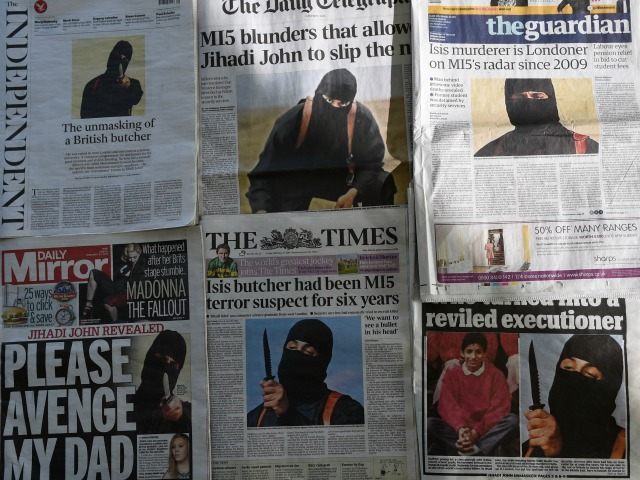The English-speaking masked terrorist who has appeared in many ISIS murder videos, known as “Jihadi John” but long ago identified as 27-year-old British expatriate Mohammed Emwazi, has been targeted by a drone strike near the Islamic State’s capital of Raqqa, Syria.
The Pentagon expressed a high level of confidence that Emwazi was killed. Fox News quotes a senior military official saying “we are 99 percent sure we got him.”
The operation was conducted by a Reaper drone armed with Hellfire missiles, according to military sources quoted by the New York Times. The drone tracked Emwazi while he met with several other people, then targeted a car in which he was traveling with another militant.
British Prime Minister David Cameron described terminating Emwazi as an “act of self-defense” and said it was “the right thing to do.”
CNN quotes Mohammed Shafiq, director of a British Muslim group called the Ramadan Foundation, agreeing with Cameron’s assessment. “The killing of Mohammed Emwazi in Syria is a significant moment in the fight to get justice for David Haines, Alan Henning and all the victims of this evil man,” said Shafiq, referring to two of the terrorist executioner’s victims.
However, CNN also reports a negative reaction from London-based civil rights group CAGE, which boasts of “campaigning against the War on Terror for more than a decade,” and says it has been in contact with Emwazi.
CAGE declared itself opposed to “extrajudicial killing of any kind,” claimed some relatives of Emwazi’s beheading victims had “mixed feelings” about the airstrike, and said he should have been captured and put on trial as a war criminal.
“His killing means key crucial questions around his joining ISIS, as well as the kidnapping and killing of hostages, will remain unanswered,” the group declared.
Labour Party leader Jeremy Corbyn sounded a similar note. “It appears Mohammed Emwazi has been held to account for his callous and brutal crimes,” he said in a statement quoted by the New York Times. “However, it would have been far better for us all if he had been held to account in a court of law. These events only underline the necessity of accelerating international efforts, under the auspices of the U.N., to bring an end to the Syrian conflict as part of a comprehensive regional settlement.”
A profile at NBC News says the Kuwaiti-born Emwazi “had a seemingly typical upbringing in West London before becoming involved with criminal gangs and Islamist extremists.” His youthful obsessions with soccer, fast food, and popular culture are cited, while his teachers and former employers described him as “quiet, hard-working, and smart enough to get the grades to attend college,” where he seemed destined for a degree in computer science.
When Emwazi was radicalized, he embraced Islamic fascism with tremendous enthusiasm, linking himself to al-Qaeda and Somalia’s al-Shabaab before falling in with ISIS.
“A friend of Emwazi told NBC News that the future ISIS fighter was also associated with a trio of armed muggers who targeted victims on bicycles in some of London’s most affluent areas. In 2011, Emwazi was charged twice with handling stolen goods but acquitted on both occasions. One member of the gang was Choukri Ellekhifi — also from Ladbroke Grove — who was killed fighting alongside al Qaeda in Syria in 2013,” says the report.
The deaths of Ellekhifi and another friend in Syria in 2013 are described as accelerating Emwazi’s “move from the small-time crook with religious tendencies he had been in London to a bloodthirsty killer and religious fanatic” by NBC News security analyst Duncan Gardham. Emwazi was also known to complain about the suspicious treatment he received from the authorities when he traveled before he eventually did exactly what they were afraid of, and used a vacation trip as the pretext for slipping into Syria to join the Islamic State.
During his ISIS career, Emwazi was noted for his brutal treatment of hostages, and for his appearance as the spokesman and executioner in the videotaped murders of Americans James Foley, Steven Sotloff, and Peter Kassig (known as Abdul-Rahman Kassig after his conversion to Islam), as well as Britons David Haines and Alan Henning, and Kenji Goto and Haruna Yukawa of Japan.
One former hostage told CNN that Emwazi “made him dance the tango with him,” before shoving him to the ground, kicking him, and threatening to cut his nose off with pliers.

COMMENTS
Please let us know if you're having issues with commenting.